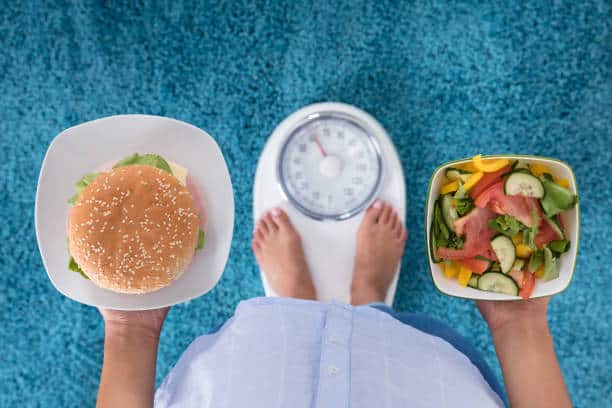Losing weight can be a challenging journey, especially when you’re not sure how many calories you should be consuming. If I weigh 250 pounds how many calories should I eat to lose weight? Determining your daily caloric needs is crucial to achieving your weight loss goals.
Understanding calories and weight is the first step towards successful weight loss. Calories are units of energy that the body uses to function properly.
The number of calories you consume and burn determines whether you gain, lose, or maintain weight. When you consume fewer calories than your body needs, it begins to burn stored fat for energy, resulting in weight loss.
To lose weight, you need to create a calorie deficit by consuming fewer calories than your body burns. The role of nutrition in weight loss cannot be overstated.
Eating a balanced diet that is rich in lean protein, healthy fats, and complex carbohydrates can help you achieve your weight loss goals. However, the number of calories you should consume depends on several factors, including your age, gender, height, weight, and activity level.

Key Takeaways
- Understanding calories and weight is crucial for successful weight loss.
- Creating a calorie deficit is essential for losing weight.
- Consuming a balanced diet that meets your daily caloric needs is key to achieving your weight loss goals.
1. Understanding Calories and Weight

Losing weight requires a calorie deficit, which means consuming fewer calories than the amount of energy the body uses. The body uses energy for basic functions such as breathing and digestion, as well as physical activity.
The number of calories needed varies depending on factors such as age, gender, height, weight, and activity level.
Calories are a measure of energy, and the number of calories in a food or drink indicates the amount of energy it provides. To lose weight, it is important to consume fewer calories than the body needs, which creates a calorie deficit.
This deficit forces the body to use stored fat for energy, resulting in weight loss.
To calculate the number of calories needed to lose weight, it is important to know the total daily energy expenditure (TDEE), which is the number of calories the body burns in a day. This includes the energy used for basic functions and physical activity.
One pound of body weight is equivalent to 3500 calories. Therefore, to lose one pound per week, a calorie deficit of 500 calories per day is needed.
However, this deficit should not be too great, as it can lead to muscle loss and a slower metabolism.
It is important to note that weight loss is not always linear and can vary from person to person. Consistency and patience are key to achieving weight loss goals.
2. The Role of Nutrition in Weight Loss

Nutrition plays a crucial role in weight loss as it provides the body with the necessary nutrients to function properly while creating a calorie deficit. A calorie deficit is essential for weight loss, and it can be achieved by consuming fewer calories than the body burns.
However, it is important to ensure that the body is still receiving enough nutrients to support overall health and well-being.
Protein is an important nutrient for weight loss as it helps build and maintain muscle mass. Muscle mass is important because it helps the body burn more calories at rest, leading to a higher metabolism.
A diet high in protein can also help reduce cravings and keep individuals feeling fuller for longer periods.
Carbohydrates are the body’s primary source of energy, but not all carbohydrates are created equal. Simple carbohydrates, such as sugar and refined grains, should be limited as they can lead to spikes in blood sugar and insulin levels.
Complex carbohydrates, such as whole grains, fruits, and vegetables, provide the body with sustained energy and important nutrients.
Fat is an essential nutrient that helps the body absorb vitamins and minerals. However, not all fats are created equal.
Saturated and trans fats should be limited as they can increase the risk of heart disease. Unsaturated fats, such as those found in nuts, seeds, and fatty fish, are important for overall health.
Fiber is important for weight loss as it helps keep individuals feeling full and satisfied. Fiber also helps regulate blood sugar levels and promotes digestive health.
A diet high in fiber can also help reduce the risk of chronic diseases, such as heart disease and diabetes.
Overall, a healthy diet that is rich in nutrients and low in calories is essential for weight loss. Registered dietitians and the U.S.
Department of Agriculture’s Dietary Guidelines for Americans can provide guidance on creating a healthy meal plan that meets an individual’s specific needs and goals.
3. Physical Activity and Weight Loss

Physical activity plays a crucial role in weight loss. It helps burn calories and increases metabolism, which leads to weight loss.
However, the amount of physical activity required to achieve weight loss varies depending on the individual’s weight, age, and activity level.
For someone who weighs 250 pounds, physical activity is essential to lose weight. The American Heart Association recommends at least 150 minutes of moderate-intensity aerobic activity or 75 minutes of vigorous-intensity aerobic activity per week.
This can be achieved through activities such as brisk walking, cycling, swimming, or running.
Resistance training, also known as strength training, is also important for weight loss. It helps build muscle mass, which increases metabolism and burns more calories.
It is recommended to do resistance training at least twice a week, targeting all major muscle groups.
Cardiovascular exercise, also known as cardio, is another effective way to lose weight. It involves activities that increase heart rate and breathing, such as jogging, cycling, or swimming.
Cardio should be done for at least 30 minutes a day, five days a week.
It is important to note that physical activity level and activity factor also play a role in weight loss. An individual’s activity level is determined by their daily routine, such as sitting at a desk all day versus standing or walking.
The activity factor takes into account the individual’s activity level and adjusts their recommended daily calorie intake accordingly.
In summary, physical activity is crucial for weight loss, especially for someone who weighs 250 pounds. A combination of aerobic exercise, resistance training, and cardio can help achieve weight loss goals.
It is important to consult with a healthcare professional before starting any new exercise routine.
4. Calorie Calculators and Their Use

Calorie calculators are a useful tool for individuals who want to lose weight. They help estimate the number of calories a person should consume to achieve their weight loss goals.
Calorie calculators take into account various factors such as age, gender, weight, height, and activity level to provide an estimate of daily caloric intake.
There are several types of calorie calculators available online, including calorie counters and calorie deficit calculators. Calorie counters are simple tools that provide an estimate of the number of calories in a particular food or meal.
Calorie deficit calculators, on the other hand, help determine the number of calories a person should consume to create a caloric deficit, which is necessary for weight loss.
To use a calorie calculator, individuals need to input their personal information, including age, gender, weight, height, and activity level. The calculator will then estimate the number of calories required to maintain current weight and the number of calories needed to achieve weight loss goals.
It’s important to note that the estimates provided by calorie calculators are just that – estimates. While they can be a helpful tool, they should not be the sole basis for making dietary decisions.
Other factors, such as individual metabolism and health conditions, can also impact weight loss.
In conclusion, calorie calculators can be a useful tool for individuals looking to lose weight. They provide an estimate of daily caloric intake needed to achieve weight loss goals.
However, it’s important to remember that these estimates are just that – estimates. Other factors should also be considered when making dietary decisions.
5. Factors Affecting Calorie Needs

When it comes to determining how many calories someone should eat to lose weight, there are several factors that come into play. These factors include gender, activity level, metabolism, body fat percentage, and pregnancy.
Gender is an important factor to consider since men and women have different calorie needs. Men typically require more calories due to their larger size and higher muscle mass.
Women, on the other hand, tend to have a higher body fat percentage, which can affect their calorie needs.
Activity level is another key factor in determining calorie needs. Someone who is sedentary and spends most of their day sitting will require fewer calories than someone who is moderately active and engages in regular exercise.
Metabolism also plays a role in determining calorie needs. Resting metabolic rate (RMR) or basal metabolic rate (BMR) refers to the number of calories the body burns at rest to maintain basic bodily functions.
Someone with a higher RMR or BMR will require more calories to maintain their weight.
Body fat percentage is another important factor to consider. Someone with a higher body fat percentage will typically require fewer calories than someone with a lower body fat percentage, as muscle tissue burns more calories than fat tissue.
Finally, pregnancy is another factor that can affect calorie needs. Pregnant women require additional calories to support the growth and development of the fetus.
The exact number of additional calories needed will depend on the stage of pregnancy and the individual’s pre-pregnancy weight.
Overall, it is important to consider all of these factors when determining how many calories someone should eat to lose weight. Consulting with a healthcare professional or registered dietitian can also be helpful in determining an individualized calorie goal.
6. Understanding Macronutrients

Macronutrients, also known as macros, are the three main types of nutrients that provide energy to the body: protein, carbohydrates, and fats. Each of these macronutrients plays a crucial role in the body’s functioning, and understanding them is essential for anyone looking to lose weight.
Protein
Protein is an essential macronutrient that is responsible for building and repairing tissues in the body. It is made up of amino acids, which are the building blocks of protein.
Protein is also responsible for regulating hormones and enzymes in the body.
When it comes to weight loss, protein is particularly important because it helps to keep you feeling full and satisfied for longer periods of time. This can help to reduce overall calorie intake and promote weight loss.
Carbohydrates
Carbohydrates are the body’s primary source of energy. They are broken down into glucose, which is used by the body for fuel.
Carbohydrates can be found in a wide range of foods, including fruits, vegetables, grains, and sugars.
When it comes to weight loss, carbohydrates can be a bit of a double-edged sword. While they provide energy to the body, consuming too many carbohydrates can lead to weight gain.
This is because excess carbohydrates are stored in the body as fat.
Fats
Fats are another essential macronutrient that the body needs for energy. They are also important for maintaining healthy skin and hair, insulating the body, and protecting organs.
When it comes to weight loss, it is important to choose healthy sources of fats, such as avocados, nuts, and seeds, and to consume them in moderation. Consuming too many unhealthy fats, such as saturated and trans fats, can lead to weight gain and other health problems.
In summary, understanding macronutrients is essential for anyone looking to lose weight. By choosing healthy sources of protein, carbohydrates, and fats, and consuming them in moderation, you can promote weight loss and improve your overall health.
7. The Impact of Food Choices on Calorie Intake

When it comes to losing weight, the number of calories consumed is a crucial factor. However, not all calories are created equal.
The type of food a person eats can have a significant impact on their overall calorie intake.
For example, a serving of rice contains approximately 200 calories, while a serving of broccoli contains only 55 calories. Similarly, a serving of grapes contains around 60 calories, while an orange contains approximately 80 calories, and an apple contains around 95 calories.
It’s essential to pay attention to serving sizes when determining calorie intake. For instance, a serving of tuna contains approximately 200 calories, but a serving size can vary significantly depending on whether it’s canned or fresh.
Another important factor to consider when it comes to food choices is alcohol. Alcoholic beverages can contain a significant number of calories, with a single beer containing around 150 calories, and a glass of wine containing around 120 calories.
Overall, making smart food choices can help reduce calorie intake and aid in weight loss. By incorporating low-calorie options like broccoli, grapes, and oranges into their diet, individuals can reduce their overall calorie intake without sacrificing taste or satisfaction.
8. Medical Considerations in Weight Loss

Losing weight is a complex process that requires careful consideration of various medical factors. A person who weighs 250 pounds may face additional health risks, such as diabetes, that can impact their weight loss journey.
Therefore, it is essential to consult with a physician before starting any weight loss program.
According to the Mayo Clinic Diet, a weight loss program that emphasizes healthy eating and regular physical activity, a safe and sustainable rate of weight loss is one to two pounds per week. To achieve this, a person who weighs 250 pounds should consume approximately 1,200 to 1,500 calories per day.
However, it is important to note that this calorie range may vary depending on individual factors such as age, gender, height, and activity level. Moreover, people with diabetes may require a different approach to weight loss, as their condition can affect their metabolism and blood sugar levels.
Therefore, it is crucial to work closely with a healthcare provider to develop a personalized weight loss plan that takes into account any medical considerations. This may involve monitoring blood sugar levels, adjusting medication dosages, and incorporating specific dietary recommendations.
In summary, weight loss is a complex process that requires careful consideration of various medical factors. People who weigh 250 pounds should consult with a healthcare provider to develop a personalized weight loss plan that takes into account any medical considerations, such as diabetes.
With the right support and guidance, it is possible to achieve safe and sustainable weight loss.
9. Weight Loss Equations

When it comes to losing weight, one of the most important factors to consider is how many calories you should be consuming. There are several equations that can be used to determine this number.
Here are three of the most commonly used equations:
Mifflin-St Jeor Equation
The Mifflin-St Jeor Equation is a formula used to estimate the number of calories a person needs to consume each day to maintain their current weight. This equation takes into account a person’s age, height, weight, and gender.
Once the number of calories needed to maintain weight is determined, a calorie deficit can be created to promote weight loss.
Harris-Benedict Equation
The Harris-Benedict Equation is another formula used to estimate the number of calories a person needs each day. This equation takes into account a person’s age, height, weight, and gender, as well as their activity level.
The Harris-Benedict Equation is often used in conjunction with the Mifflin-St Jeor Equation to provide a more accurate estimate of calorie needs.
Hall Equation
The Hall Equation is a more recent formula that takes into account a person’s body composition, including their fat mass and lean mass. This equation is more accurate than the Mifflin-St Jeor and Harris-Benedict Equations, but it is also more complex and requires more information to be inputted.
It’s important to note that these equations are just estimates and should not be taken as exact values. Other factors, such as metabolism, genetics, and lifestyle habits, can also affect calorie needs.
It’s always a good idea to consult with a healthcare professional before making any significant changes to your diet or exercise routine.
10. The Importance of Tracking Calories

Tracking calories is an essential part of losing weight. Without tracking, it is difficult to know how many calories are being consumed and how many are being burned.
This can make it challenging to create a calorie deficit, which is necessary for weight loss.
Calorie counting involves keeping track of the number of calories consumed and burned each day. This can be done manually or with the help of apps and online tools.
By tracking calories, individuals can determine their daily calorie needs and create a calorie deficit by reducing calorie intake or increasing physical activity.
Tracking calories can also help individuals identify areas where they may be consuming excess calories. For example, they may discover that they are consuming too many calories from sugary drinks or snacks.
By identifying these areas, individuals can make changes to their diet and reduce their calorie intake.
Creating a calorie deficit is necessary for weight loss. A calorie deficit occurs when an individual consumes fewer calories than they burn each day.
This can be achieved by reducing calorie intake, increasing physical activity, or a combination of both. By tracking calories, individuals can determine the number of calories they need to consume each day to create a calorie deficit and lose weight.
In conclusion, tracking calories is an essential part of losing weight. It allows individuals to determine their daily calorie needs, identify areas where they may be consuming excess calories, and create a calorie deficit necessary for weight loss.
By tracking calories, individuals can take control of their weight loss journey and achieve their goals.
11. Preventing Muscle Loss During Weight Loss

Losing weight is a goal that many people have, but it’s important to do it in a healthy way that doesn’t lead to muscle loss. When someone is trying to lose weight, they often focus on reducing their calorie intake.
However, if someone reduces their calorie intake too much, they risk losing muscle mass along with fat.
Muscle loss can be a problem because it can slow down someone’s metabolism, making it harder for them to lose weight and keep it off. To prevent muscle loss during weight loss, it’s important to focus on a few key things.
Protein Intake
Protein is essential for building and maintaining muscle mass, so it’s important to make sure that someone who is trying to lose weight is getting enough protein in their diet. The amount of protein someone needs will depend on their weight and activity level, but a general guideline is to aim for 0.8 grams of protein per kilogram of body weight.
Resistance Training
Resistance training, such as weightlifting, is also important for preventing muscle loss during weight loss. When someone is losing weight, their body may start to break down muscle tissue for energy.
However, if someone is doing resistance training, their body is more likely to use fat for energy instead of muscle.
Calorie Deficit
While it’s important to be in a calorie deficit to lose weight, it’s also important not to reduce calorie intake too much. A general guideline is to aim for a deficit of 500-750 calories per day.
This will help someone lose weight at a steady and healthy pace without risking muscle loss.
In summary, preventing muscle loss during weight loss is important for maintaining a healthy metabolism and achieving long-term weight loss success. To prevent muscle loss, it’s important to focus on getting enough protein, doing resistance training, and maintaining a healthy calorie deficit.
12. Maintaining a Healthy Weight

Maintaining a healthy weight is essential for overall health and well-being. It is important to note that a healthy weight is not just about looking good, but it is also about reducing the risk of chronic diseases such as heart disease, diabetes, and certain types of cancer.
To maintain a healthy weight, one must consume the appropriate amount of calories based on their individual needs. This is known as maintenance calories, which is the number of calories needed to maintain current weight.
Calculating maintenance calories can be done using various methods, including the Harris-Benedict equation or the Mifflin-St. Jeor equation. These equations take into account factors such as age, gender, weight, and height to determine the appropriate number of calories.
It is important to note that maintaining a healthy weight is not just about calorie intake. Physical activity also plays a crucial role in weight maintenance and overall health.
Regular exercise can help increase metabolism, burn calories, and improve overall health.
Another important factor in maintaining a healthy weight is monitoring body mass index (BMI). BMI is a measure of body fat based on height and weight.
A healthy BMI range is typically between 18.5 and 24.9.
In summary, maintaining a healthy weight requires a balance of proper calorie intake, regular physical activity, and monitoring BMI. By following these guidelines, individuals can reduce their risk of chronic diseases and improve overall health and well-being.
13. Frequently Asked Questions
How many calories should a 250 lb woman eat to lose weight?
A 250 lb woman should eat approximately 1,500 to 1,800 calories per day to lose weight. However, the exact number of calories required for weight loss may vary depending on factors such as age, height, activity level, and weight loss goals.
How many calories should a 250 lb man eat to lose weight?
A 250 lb man should eat approximately 1,800 to 2,200 calories per day to lose weight. However, the exact number of calories required for weight loss may vary depending on factors such as age, height, activity level, and weight loss goals.
How many calories should I eat a day to lose weight at 250 pounds?
To lose weight at 250 pounds, it is recommended to eat approximately 1,500 to 2,200 calories per day. However, the exact number of calories required for weight loss may vary depending on factors such as age, height, activity level, and weight loss goals.
How long does it take a 250 pound person to lose 50 pounds?
It typically takes a 250 pound person approximately 20 to 25 weeks to lose 50 pounds through a combination of diet and exercise. However, the exact time frame may vary depending on factors such as age, gender, starting weight, and weight loss goals.
How much weight can you lose eating 1,000 calories a day?
Eating 1,000 calories a day may result in rapid weight loss, but it is not recommended as it may not provide enough nutrients for the body to function properly. It is recommended to aim for a slower and more sustainable weight loss of 1 to 2 pounds per week.
How many calories should I eat to lose weight at 240 pounds?
To lose weight at 240 pounds, it is recommended to eat approximately 1,400 to 2,000 calories per day. However, the exact number of calories required for weight loss may vary depending on factors such as age, height, activity level, and weight loss goals.

Iesha is a loving mother of 2 beautiful children. She’s an active parent who enjoys indoor and outdoor adventures with her family. Her mission is to share practical and realistic parenting advice to help the parenting community becoming stronger.
